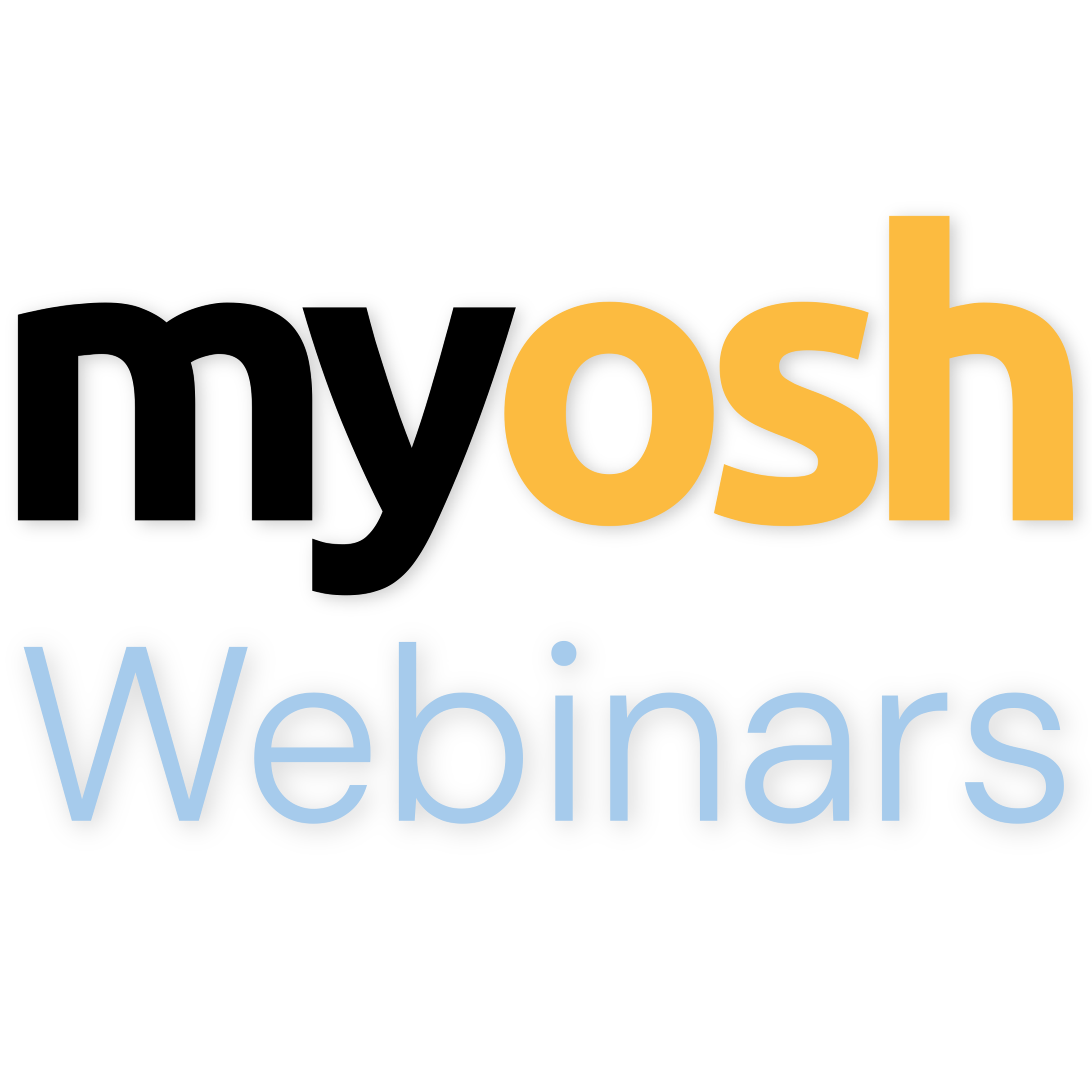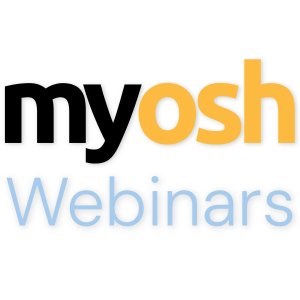
9.6K
Downloads
243
Episodes
myosh hosts regular HSEQ Industry Webinars. These podcasts include all of our webinars presented by leading industry experts and include topics such as Safety Differently, Mental Health, HSEQ Law, Leadership, Learning Teams, HOP (Human Organisational Performance), Chain of Responsibility, Safety Culture, Climate and much more.
Episodes

Tuesday Sep 28, 2021
How to Have Supportive Conversations
Tuesday Sep 28, 2021
Tuesday Sep 28, 2021
Presented by Anthony Gibbs (CEO, Sentis)
We find ourselves in unprecedented times. The uncertainty created by current events, including COVID-19, has led to increased stress, distraction and anxiety in the workplace. For some, this is in addition to the recent devastations of drought, fire and flood. But what happens when workers find their stress compounding and fail to recognise it?
As a leader, it’s important to recognise when a worker may need to access support. This webinar will provide a framework to help leaders understand the difference between a team member thriving and surviving—and if they are surviving, whether they’re simply going through a bad patch or if they require extra support to manage a mental health issue or illness.
Session outcomes:
-
- Understand a framework to recognise the difference between team members who thrive or survive during stress and crisis
- Gain insights around the dos and don’ts of supportive conversations
- Learn practical tools for effective conversations that guide team members towards support

Tuesday Sep 28, 2021
Workplace Hygiene Management During a Pandemic
Tuesday Sep 28, 2021
Tuesday Sep 28, 2021
Presented by Dr Michael Taylor
COVID-19 has presented a series of challenges to our health, safety and business continuity. Whilst many of the recommendations for combatting this novel coronavirus are still being debated, the principles underpinning good workplace hygiene will still mitigate much of the risk, and provide a framework for managing this outbreak, and future pandemics.
This webinar covers what we know about COVID-19, how long it persists in the environment, transmission, PPE, and disinfection, and touches on wider principles which can be used to rapidly respond to future emergency situations.
Examples of best practice being employed in companies across Australia in a variety of industries are also shared.

Thursday Sep 23, 2021
Beyond TRIFR: Creating Meaningful and Measurable Lead Indicators for Safety
Thursday Sep 23, 2021
Thursday Sep 23, 2021
resented by Anthony Gibbs (CEO, Sentis)
What’s covered?
Businesses invest big in safety improvement initiatives, yet relatively few can pinpoint the positive effects of these on their safety culture. The natural tendency is to turn to lag indicators. And while not inherently bad, these measures only provide part of the picture.
Businesses who excel at safety are looking to lead metrics to not only demonstrate a clear return on safety investment, but to also better predict and prevent incidents in the workplace. Knowing where to start is often the first hurdle. The second is convincing senior stakeholders to buy into a new way of measuring safety.
Join Sentis CEO, Anthony Gibbs to explore how the best in the business track safety performance with their executive’s full support.
Key takeaways:
-
- Popular success measurement and metrics
- The challenge with traditional lag indicators
- Lead metrics that resonate with senior stakeholders
- How to use metrics to build a case for safety culture change

Tuesday Sep 21, 2021
Managing Mental Health in the Workplace During COVID-19 Lockdowns
Tuesday Sep 21, 2021
Tuesday Sep 21, 2021
Presented by Emma Pritchard and Jenny Inness (Harmers Workplace Lawyers’ Executive Counsel)
What’s covered?
Employers are facing a significant increase in serious mental health concerns within their workforces due to the ongoing impact of the COVID pandemic, and the extended lockdown and stay-at-home public health orders currently in place across many States and Territories.
Whilst working from home is an important safety measure at this time, the stress and anxiety caused by isolation and other associated stressors are giving rise to different safety concerns for workers from a mental health perspective.
In this webinar, Harmers’ Executive Counsel, Emma Pritchard and Jenny Inness, will provide guidance on:
How employers can identify workers who may need help:
-
- Guidance for employers on sensitive and appropriate conversations to ascertain the health and wellbeing of your workers
- Guidance on questions to ask and what not to ask when discussing mental health with your workers
What are your legal obligations as an employer in relation to mental health in the workplace?
-
- Work health and safety obligations
- Disability discrimination legislation (including reasonable adjustments for mental health and inherent requirements of the job)
- Contractual obligations
What can employers do to carefully look after workers’ mental health and to maintain a positive workplace culture?
-
- Guidance for employers on when employers can: Implement reasonable adjustments to accommodate mental health issues; Issue reasonable and lawful directions to manage sensitive mental health issues; Obtain independent medical assessments about fitness to work; Issue directions to take leave to manage mental health concerns
- Guidance for employers to provide a supportive and positive workplace culture that can accommodate workers with mental health issues

Thursday Sep 16, 2021
Finding Out What Works and Doing More of It – Part 2
Thursday Sep 16, 2021
Thursday Sep 16, 2021
What’s covered?
How can Safety leaders and professionals change the focus of their conversations and impact change fast?
Did you attend the myosh – “Finding what works and doing more of it” session in May this year? If you did attend, then this is the Part 2 session.
Covid, lockdowns and working from home has created many challenges and constraints on how we work and live. Change is hard and particularly adapting to change. Well, it does not have to be. If we want to help ourselves and the people we lead to change and adapt fast, then being solution-focused and helping steer people to what is working will have a greater impact.
This session shows you again in action what the difference is between being problem-focused as compared to solution-focused and how you can form better relationships with your peers, clients, team members and even family members if you stick with a solution focus approach, especially now in a time of great uncertainty. You will get to see it in action again!

Thursday Sep 16, 2021
Learning about Normal Work – Drawing on Latest Research and Innovative Practices
Thursday Sep 16, 2021
Thursday Sep 16, 2021
Presented by Marc McLaren (Art of Work)
What’s covered?
Organisations invest considerable time and effort to observe and learn about how work is being undertaken, in order to improve safe work outcomes. This combined effort, involving leaders, workers, Health and Safety practitioners, other functional specialists and administrative support can be broadly described as Work Interactions. The collective noun Work Interaction is intentionally used to capture a range of practices that aim to promote engagement, learning and behavioural and organisational change.
This webinar will cover the latest research into the broad area of Work Interactions and the insights gained from twelve Australian and overseas WHS practitioners who are actively seeking to enhance Works Interactions and share their experiences. The conversation will then move to how the learning and benefits gained by both those who initiate and participate can be enhanced, as well as an invitation to participate in the ongoing collaborative research work.

Thursday Sep 16, 2021
Learning about Normal Work – Drawing on Latest Research and Innovative Practices
Thursday Sep 16, 2021
Thursday Sep 16, 2021
Presented by Marc McLaren (Art of Work)
What’s covered?
Organisations invest considerable time and effort to observe and learn about how work is being undertaken, in order to improve safe work outcomes. This combined effort, involving leaders, workers, Health and Safety practitioners, other functional specialists and administrative support can be broadly described as Work Interactions. The collective noun Work Interaction is intentionally used to capture a range of practices that aim to promote engagement, learning and behavioural and organisational change.
This webinar will cover the latest research into the broad area of Work Interactions and the insights gained from twelve Australian and overseas WHS practitioners who are actively seeking to enhance Works Interactions and share their experiences. The conversation will then move to how the learning and benefits gained by both those who initiate and participate can be enhanced, as well as an invitation to participate in the ongoing collaborative research work.

Tuesday Sep 14, 2021
Safety Differently – A Balanced Conversation
Tuesday Sep 14, 2021
Tuesday Sep 14, 2021
Presented by Andy Shone
Safety professionals and organisations all over the world are having conversations about Safety Differently. But what is Safety Differently, different from? What challenges is Safety Differently a response to? And what does it look like in practice?
This webinar provides some answers to these questions through an exploration of the key principles of Safety Differently.
Key resources mentioned in the presentation:
- Books
The Field Guide to Understanding Human Error
Safety-I and Safety-II: The Past and Future of Safety Management - HOP | LAB
The HOP|LAB is a space for the sharing of new ideas, research, opinions and experiences that support the application of Human and Organisational Performance. - Video
Safety Differently: The Movie

Tuesday Sep 14, 2021
Understanding the Drivers of Incident Underreporting
Tuesday Sep 14, 2021
Tuesday Sep 14, 2021
Presented by Anthony Gibbs (CEO, Sentis)
Accurate and timely reporting of safety incidents is a crucial component of a positive safety culture. These invaluable learning opportunities allow us to adapt, make improvements and prevent future injury. Yet, recent Australian data has found that on average, 31% of incidents go unreported and in some organisations, this figure rises as high as 53%*. And it’s not just frontline workers failing to report; leaders and managers also underreport at alarming rates.
In this webinar, we explore the three key drivers of underreporting and how to strategically address each one to drive improved safety outcomes, along with key takeaways to push your safety culture in a positive direction.
Session outcomes:
-
- Explore insights from a global research study of 12,460 participants across industry
- Discover underreporting rates across team, leader and management levels
- Understand the three key drivers of underreporting and the risks to your business
- Learn strategies for addressing underreporting in your business

Tuesday Sep 14, 2021
The 4-Step Methodology For Reopening Businesses Post COVID
Tuesday Sep 14, 2021
Tuesday Sep 14, 2021
Presented by Jeremy Leu (Pacific General Manager, Bureau Veritas)
COVID-19 has changed businesses and will continue to change the way they operate in the coming future, even after the pandemic ends. Despite the situation being unlikely to return to ‘normal’, the priority for all businesses is to return to work as quickly as possible and with optimum health, safety and hygiene conditions for their employees and clients.
Businesses planning to restart their operations will face significant challenges to safeguard their employees and clients from health and safety risks related to the spread of COVID-19. Organisations will also need to be able to protect and build trust with their employees and clients, as well as promote transparency and credibility to the society in order to reoperate efficiently.
Bureau Veritas Australia has developed a methodology: SafeGuard Assurance Program to meet the requirements of all business sectors of the economy as they gradually reopen for business.
-
- Validation of the guidelines – which your facilities are assessed against
- Self-assessment questionnaire – to be completed by each of your facilities
- Independent audit – of your facilities by Bureau Veritas
- Issuance of compliance certificate/label – to each of your audited facility
